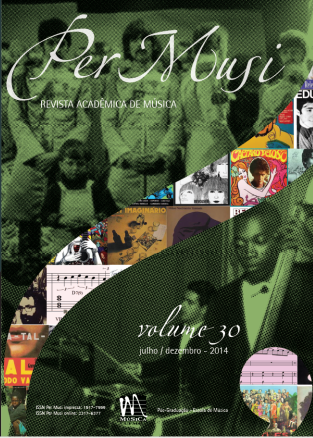O caso do Som Imaginário
contracultura, experimentação e indústria fonográfica entre as décadas de 1960 e 1970
Palavras-chave:
Som Imaginário e música instrumental, MPB e contracultura, Indústria fonográfica na década de 1970Resumo
Neste artigo, pretendemos articular a produção musical do grupo com o contexto da MPB no começo da década de 70, marcado principalmente pela ditadura em seu momento mais repressivo e pela consolidação da indústria fonográfica no país. No que se refere aos dois primeiros álbuns, ambos homônimos, nos deteremos nas letras das canções, que revelam os posicionamentos políticos e os valores culturais daquela geração dos anos de 1970, que sofria os efeitos da repressão ditatorial ao mesmo tempo em que recebia tardiamente as informações estrangeiras da contracultura e do movimento hippie.
Referências
ARAGÃO, Paulo de Moura. Pixinguinha e a gênese do arranjo musical brasileiro (1929 a 1935). Dissertação de mestrado, UniRio, 2001.
BAHIANA. Ana Maria. O caminho do improviso à brasileira In NOVAES, Adauto. Anos 70: ainda sob a tempestade. Seleção de Artigos. Rio de Janeiro. Editora Senac Rio, 2005.
_________________. Almanaque anos 70. Ediouro, Rio de Janeiro, 2006.
COELHO, Frederico. Eu, brasileiro, confesso minha culpa e meu pecado – Cultura marginal no Brasil nas décadas de 1960 e 1970. Rio de Janeiro. Civilização Brasileira. 2010.
JONES, Charles E. The Black Panther Party reconsidered. Black Classic Press, Baltimore, MD. 1998.
HAERLE, Dan, The Jazz Language. A theory text for jazz composition and Improvisation. Florida, Studio 224. 1980.
HOLLANDA, Heloísa Buarque. Impressões de viagem – CPC, vanguarda e desbunde: 1960/70. São Paulo, Editora Brasiliense, 2ª edição,1981.
LARANJEIRA. Artur. A casa do Tobias. Folha de São Paulo. São Paulo, 05 fev. 1971, Caderno Ilustrada, 05 fev 1971. Seção Shows, p.17.
MACIEL, Luís Carlos. Negócio Seguinte. Rio de Janeiro. Codecri, 1981.
MACIEL, Luís Carlos. Anos 60. Porto Alegre, L&PM. 2ª edição. 1987.
MARTIN, Bill. Listening to the Future - The time of progressive rock. 1968-1978 - Ed. Open Court, 1998.
MILLARCH Aramis. Miranda, o homem-disco - Jornal Estado do Paraná - Tablóide, p.1-4. 05 de maio de 1976.
MOREIRA, Maria Beatriz Cyrino. Fusões de gêneros e estilos na produção da banda Som Imaginário. Dissertação de Mestrado. Instituto de Artes. Universidade Estadual de Campinas. Campinas. 2011.
MORELLI, Rita de Cássia Lahoz. O campo da MPB e o mercado moderno de música no Brasil: do nacional popular à segmentação contemporânea. ArtCultura.Uberlândia.vol.10 nº16, p.87-101. jan-jun. 2008.
NAPOLITANO, Marcos. “Seguindo a canção” engajamento político e indústria cultural na MPB (1959-1969). São Paulo. Annablume: Fapesp, 2001.
NAPOLITANO, Marcos. A música popular brasileira (MPB) dos anos 70: resistência política e consumo cultural. In: IV Congresso de la Rama latinoamericana del IASPM, 2002, Cidade do México.
NAVES Santuza Cambraia.Canção popular no Brasil: a canção crítica. Rio de Janeiro: civilização Brasileira, 2010.
NOVAES, Adauto. Anos 70: ainda sob a tempestade. Seleção de Artigos. Rio de Janeiro. Editora Senac Rio, 2005.
RISÉRIO, Antonio. Anos 70: trajetórias. Instituto Cultural Itaú, Editora Iluminuras LTDA, 2006.
SARAIVA, Joana Martins. A invenção do sambajazz: discursos sobre a cena musical de Copacabana no final dos anos de 1950 e início dos anos 1960. Dissertação de mestrado Departamento de História da PUC-Rio, 2007.
SHEPERD, et.al. (Org). Continuum Encyclopedia of Popular Music of the World. Vol II: Performance and Production. London, New York, Continuum, 2003.
SILVA, Beatriz Coelho. Wagner Tiso Som, Imagem, Ação. Coleção Aplausos, Imprensa Oficial, São Paulo, 2009.
TAGG, Philip. Everyday Tonality – toward a tonal theory of what most people hear. The Mass Media Scholar ́s Press, Inc. New York & Montreal, 2009.
ZAN, José Roberto. Música Popular Brasileira, indústria cultural e identidade. EccoS revista científica, junho, Vol.3, n.001. p.105-122. Centro Universitário Nove de Julho. São Paulo. 2001.
Discografia
Som Imaginário. LP. Som Imaginário.1970. EMI Odeon.
Som Imaginário. LP. Som Imaginário. 1971. EMI Odeon.
Som Imaginário. LP. Matança do porco. 1973. EMI Odeon.
Milton Nascimento. LP. Milton Nascimento. 1970. EMI Odeon.
Entrevistas
CARVALHO, Luis Otávio de Melo (Tavito). 16 jan 2010. São Paulo – SP. Entrevista concedida à autora.
OLIVEIRA, Frederico Mendonça de (Fredera). 18 set. 2010. Alfenas - MG. Entrevista concedida à autora
Downloads
Publicado
Edição
Seção
Licença

Este trabalho está licenciado sob uma licença Creative Commons Attribution 4.0 International License.

Exceto onde está indicado, o conteúdo neste site está sob uma Licença Creative Commons - Atribuição 4.0 Internacional.












